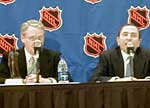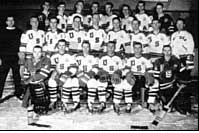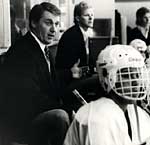Herb Brooks goes for the gold again
By William Wilcoxen
Minnesota Public Radio
January 15, 2002
|
| RealAudio |
St. Paul native Herb Brooks received one of hockey's most prestigious awards Tuesday. Brooks was among the winners of the Lester Patrick Awards, which honor outstanding service to hockey in the United States. At a ceremony in St. Paul, Brooks reflected on his Olympic coaching experiences - of the past and present.
| |
|
|
|
||
Brooks was a successful coach at the University of Minnesota and in the National Hockey League, but is best known for leading the U.S. Olympic team to a surprising gold medal in 1980. This year's other Patrick Award winners are the 1960 U.S. Olympic team, which also won a gold medal, and Larry Pleau, a former Olympian who is now a general manager in the NHL.
On a day of tributes and accolades, NHL Commissioner Gary Bettman momentarily brought Brooks down to earth as he mused on the Olympic connections of this year's award winners.
"The 1980 Miracle on Ice was probably recognized as the pre-eminent moment in sports for the entire century. And you were also the last person cut from the 1960 team, isn't that correct?" laughed Bettman.
The coach who cut Brooks from that 1960 team, Jack Riley, got into the spirit of ribbing and reminiscing, reminding Brooks that fewer players were permitted on the team in those days.
"And if I had known in '60 that Herb was going to coach in '80, he would've been on that '60 team," joked Riley.
| |
|
|
|
||
"Actually, Coach is being kind of nice," Brooks said. "He bypassed my lack of talent. But, to set the record straight, my dad said 'Coach Riley cut the right guy, didn't he?' So that is the truth."
Herb Brooks did play on Olympic hockey teams in 1964 and '68, before making a name for himself in coaching. In a few weeks he'll be behind the bench again in Salt Lake City when this year's Olympic team takes the ice. But for Brooks the exerience will be vastly different than that of 1980.
Today, professionals are allowed to take part in the Olympics. So instead of molding an amateur team through months of practices, Brooks has instead assembled an all-star team of the best American players on NHL rosters. He says that reduces his role considerably.
"The young people we had in 1980 - it was a bunch of young college kids. We were trying to take them out of their comfort zone of being college athletes, college All-Americans, and play at a certain tempo of world class competition in the Olympic Games," Brooks said. "But this is a different thing. I'm not going to be introducing a lot of things to these athletes. I'm not going to be telling them things they don't already know. They all come from good programs, excellent coaches. It's more a reminder. It's really their show."
| |
|
|
|
||
While there won't be the need - or time - to teach hockey skills this year, Brooks says strategizing during and between games will be important. International competitions use a wider ice sheet than the NHL. Brooks says that benefits the European finesse players rather than the more physical North Americans.
Commissioner Bettman is optimistic the U.S. and Canada will bounce back from their poor showings at the 1998 Olympics in Nagano. The Olympics are now an important showcase for the NHL, which is trying to nurture fans in the populous Sun Belt cities that have gained teams in recent years.
Between the quick U.S. exit and the tape-delayed telecasts from Nagano, the NHL got very little boost from the '98 games. Bettman has high hopes for this year.
"With CNBC and NBC carrying 30 games live and in their entirety, we think more people will have a chance to see this game and really get interested in the game," Bettman said.
This year's Winter Olympics begin on Feb. 8 and continue through Feb. 24.
More from MPRMore Information



